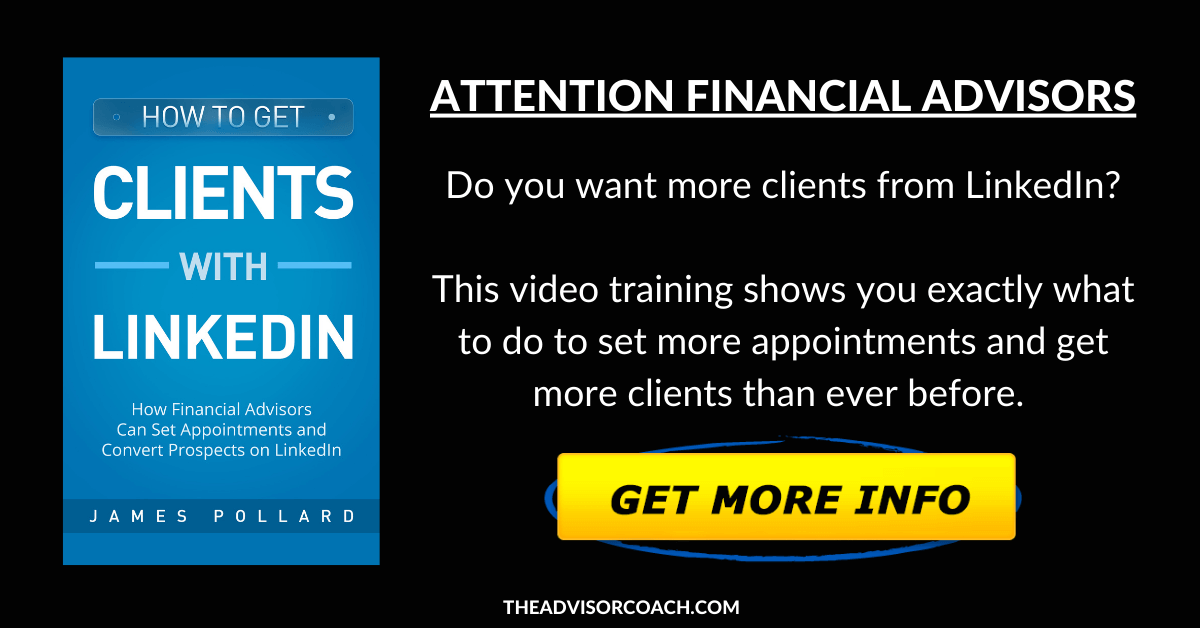12 Best Financial Planning Questions to Ask Clients: Questions Great Financial Advisors AskFinancial services and planning goes well beyond just ETFs, insurance and mutual funds. To really succeed, you must understand that this is a RELATIONSHIP business.
One of the biggest competitive advantages you can possibly have as a financial advisor is the ability to listen and get to know your client. You get to know your client by asking the right questions. Here are some questions that financial advisors can ask, in no particular order, to get to know their clients and better serve their needs. Want to jump ahead to a specific question? Use the links below:
1. Have You Ever Worked With A Financial Advisor Before?This question helps gauge their experience with the financial planning process, as well as gives you some insight into what their experience has been so far.
If they’ve worked with a financial advisor before but ended the relationship, find out why. This is critical as it will help you figure out what is important to the client as well as help you avoid making the same mistakes that the last advisor made. If they have never worked with a financial advisor, it’s a great opportunity to introduce them to you, your practice, and how you can help. I've found that it's easy for financial advisors to suffer from "the curse of knowledge". This is a cognitive bias that occurs when an individual, communicating with other individuals, unknowingly assumes that the others have the background to understand. In other words, financial advisors are so involved in finance, money, and investing that they can overwhelm someone who has never worked with an advisor. ALSO READ: 9 Elevator Speech Tips for Financial Advisors 2. What Are You Doing Now?You want to get a good overview of the client’s current financial life. This question is meant to be casual and you can take it wherever you want - from retirement planning, insurance coverage, to budgeting. If you’re going to help your clients accomplish their goals, it’s important to understand their starting point.
Back when one-on-one coaching was my main offering here at The Advisor Coach, this was one of the first questions I'd ask financial advisors because it helped me understand their point of view. For example, if they told me they were doing content marketing but weren't seeing results, I would make a note to explore how to help them with their content. The same idea applies to financial advising - you can't help a client until you understand what he or she is doing now. Some clients may have such a messy financial picture (no insurance, mutual funds with high fees, etc.) that you need to focus on cleaning up the mess before moving forward. 3. Do You Feel As If You're Currently Reaching Your Goals?This question will give you a few clues as to why the client wants a financial advisor. Some people feel like they have no clue what to do or where to begin - in this case, if they’re not reaching their financial goals, you know that you should have a strong, guiding presence.
If they are reaching their goals and everything seems to be on track, maybe they just need some reassurance, or perhaps they’re looking for someone who can offer additional information that they were unaware of before. Either way, it’s a perfect chance for you to demonstrate your added value. ALSO READ: The Secret Behind Awesome Financial Advisor Value Propositions 4. Why Do You Think You Need Help?After asking the previous questions, you should already have a basic idea of why the client thinks he/she needs help, but it’s always best to hear it directly from the source.
Some people like to handle their finances themselves, while others want someone there to do things for them. Others might have the bulk of their financial plan in order but have a few intricate details that need to be worked out or gaps that need to be filled. However, you will never know if you don’t ask. Whatever it is, pay attention to the answer and make sure that you serve their needs. I've seen too many financial advisors assume their clients want certain things, only to encounter resistance later. 5. What Changes Are You Expecting To Occur In The Future?This is where you really start to get to know your client and get involved in his/her life. One of the reasons why it’s impossible to have a “one size fits all” financial plan is that we’re all different and our lives are constantly changing. If you know the changes that are on the horizon, you are in a much better position to plan and prepare for them.
Examples of changes that might occur are aging parents, children, grandchildren, college tuition payments, student loan/mortgage payoffs, home ownership, starting a small business, marriage, and more. All of these are major life events that can have major financial implications, but being prepared for them will help you steer your client in the right direction. ALSO READ: A Day In The Life of a Financial Advisor 6. What Has Been Your Investment Experience So Far?The answer to this question will let you know how hands-on your client is with his/her investments. This question is similar to the “What are you doing now?” question, but this one considers the past as well. Look at whether the client has increased or decreased involvement in investing. Why has this happened?
Your approach to someone with many years of in-depth investment experience will be different from someone with virtually no experience. This question will allow you to quickly see where you stand and help you cut right to the chase. This question also helps you sniff out whether or not the person has been led astray in the past. For example, someone nearing retirement with an excessive position in the stock market may have been given bad advice in the past. Knowing this can help you adjust your approach to the client. ALSO READ: The Top 15 Best Investing Books Of All Time 7. What Are Your Values? Or, Besides Money, What Is Important To You?Financial advisors don’t just deal with money and investments - they deal with feelings, dreams, purpose, and legacy. By asking this question, you can find out what your client feels is his or her higher calling. This will help you figure out what really matters to clients so you can align your planning with those values.
I remember speaking with an advisor who found out a client was deeply involved in educating people about alcohol abuse. This advisor pointed out that, through certain investment funds, the client was invested in alcohol companies. He promptly helped her liquidate her investment so she wouldn’t hold a stake in any alcohol companies whatsoever. This seems like a small detail that’s fairly easy to overlook, but it means the world to the client. ALSO READ: How Financial Advisors Can Make A Phenomenal First Impression 8. How Do You Picture Your Life 1/3/5 Years From Now?A lot of people think that financial planning is just about retirement. While retirement is a big part of one’s financial picture, it encompasses a lot more than that. This question is similar to the “What changes are you expecting to occur in the future?” question except this includes the client’s short-term goals as well.
Many people have no idea that financial advisors can help them navigate a home purchase, plan for starting a small business or go through a divorce. By starting this conversation with your client, you set the tone for building a relationship outside of just retirement planning. ALSO READ: 7 Actionable Goal Setting Tips For Financial Advisors 9. What Are Your Most Pressing Financial Concerns?The answer to this question will tell you why you got hired in the first place. Whatever the client says here should be your primary focus. If you cannot at least address the client’s biggest concerns, you won’t last very long. Can you make recommendations? Sure, but not asking this question is a big mistake. Otherwise, you’re just guessing as to what your main objective should be.
ALSO READ: 7 Awesome Content Marketing Tips for Financial Services 10. Why Did You Choose Me?This is one of the BEST questions you can possibly ask because it helps you figure out how you’re positioned in the marketplace. How do other people see you?
It doesn’t matter what you think you look like - the only thing that matters is how your prospects see you. This question helps you get some insight into what they see in you and what they expect from you. Also, if you get an answer that is significantly different from how you’re trying to portray yourself and your business, you know that you have some work to do. If you find yourself getting the same or similar answers from different clients, you probably want to make that your main marketing message and amplify it across all of your materials. ALSO READ: 11 Tips For Writing A Stellar Financial Advisor Bio (With Examples) 11. Do You Tend To Be An Optimist Or A Pessimist?To some of you, this might seem like a trivial question but it’s extremely important. It’s critical that you know your prospect’s mindset and how he or she will respond to life events, including market trends.
Without getting into too much detail, optimists tend to take more risks, while pessimists tend to be better planners. Optimists tend to stay in the market as it drops, while pessimists are more likely to pull out of a falling market and hold cash, where they may miss out on earnings opportunities. Knowing whether your client sees the glass as half full or half empty will help you tweak your approach for each individual client. 12. Do You Have A Household Budget?To help your clients reach their money goals, you need to understand their spending habits. This gives you a glimpse into how they handle both income and expenses. Some people are meticulous savers and scrimp every penny, while others are lavish spenders.
You would think that by the time someone gets to a financial advisor there would be a household budget in place, but you and I both know that isn’t the case. If there’s no budget, that should be one of the first items on the to-do list. A budget doesn’t have to be complicated, but it’s the foundation to other financial goals. If the client is expecting major life changes (another important question to ask), the advisor can bring the value of his or her past experience working with individuals who have made similar lifestyle changes. P.S. If you're a financial advisor who wants to get more clients from LinkedIn, make sure you check out How to Get Clients With LinkedIn: How Financial Advisors Can Set Appointments and Convert Prospects With LinkedIn P.P.S. If you're someone who is curious about hiring a financial advisor, read this article: Do I Need A Financial Advisor? |



